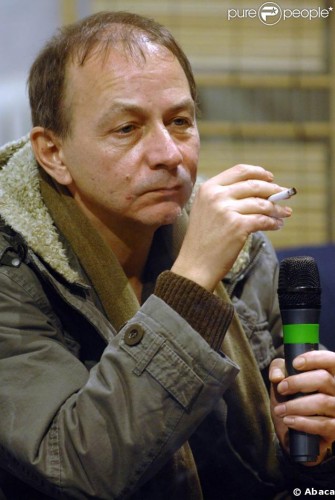mardi, 04 octobre 2011
Houellebecq and the narrow, very liberal culture of nationalism in America
Houellebecq and the narrow, very liberal culture of nationalism in America
by Graham Lister
Ex: http://majorityrights.com/
 It is my opinion that Michel Houellebecq should be on the reading list of any committed non-liberal - assuming, of course, this paragon of nationalist virtue is interested in culture. And I think people who are seriously interested in understanding the grotesque spectacle of post-modern, ultra-liberal, hyper-modernity should be so interested. Cultural values are at the core of self-conception and define the contours of the political imagination.
It is my opinion that Michel Houellebecq should be on the reading list of any committed non-liberal - assuming, of course, this paragon of nationalist virtue is interested in culture. And I think people who are seriously interested in understanding the grotesque spectacle of post-modern, ultra-liberal, hyper-modernity should be so interested. Cultural values are at the core of self-conception and define the contours of the political imagination.
The malaise facing the West goes far deeper than PeeCee and multiculturalism, even if they can be regarded as the most egregious symptoms of our total embrace of liberalism (that is, liberalism as the foundational paradigm for politics, culture, economics et al, rather than a secondary “corrective” ideology which is how classical liberalism arose).
Unfortunately no-one has a positive agenda to rebalance the West upon a sustainable course. There are of course some excellent critiques of the problems but, as yet, no really credible, putative solution has coalesced into a substantive form.
A comments elsewhere on the blog mentioned the spurning of Houellebecq, and I want to return to that. It strikes me that American nationalists in particular have a very narrow range of “cultural resources” that they bring to their politics. This also is true of many ‘nationalists’ across the board. How many times have the virtues of institutional religion (typically in the ‘Jesusland’ style) been offered as the “solution”, or indeed some bizarre “new” version of fascism offered up? Pardon the paradox but both are deeply trivial non-answers (for rather obvious reasons). The exhaustion of the already exiguous political and cultural imagination of nationalists is palpable (neo-Nazi techno anyone??? - Jesus wept). There is, sadly, a lack of genuine radicalism or innovative thought – in the true sense of thinking about these issues both deeply and widely, and in being ruthless in the analysis of old assumptions and outdated or discredited shibboleths.
Returning to Houellebecq, he is deeply anti-American in outlook, and this animosity is not without very good reason. It seems that, in general, Americans - nationalists often included - completely fail to understand that their own nation is the most profoundly liberal nation in history. America was conceived as an inorganic “social experiment” in terms of Enlightenment-derived individual liberty. Individualistic liberalism is the true American ideology/religion. To be sure, it is not the only theme in American life but the others have been peripheral to the cardinal (liberal) impetus animating American culture and society. I have encountered very few American non-liberals (a Hayekian liberal who thinks he is a conservative is still a sub-species of the liberal genus). The axiomatic and defining role of liberal philosophy in American society is something that the overwhelming mass of American people, even self-described conservatives and nationalists, have a very hard time understanding. Collectively, America has drunk from that particular (liberal) well more deeply, and for longer, than any European society.
Of course, all of the West has caught the liberal disease which is deeply corrosive to the collective well-being of ordinary Europeans – truly, we are Voltaire’s bastards. To be sustainable, any society must balance the collective interests - those unifying forces that build cohesion and social capital - and the legitimate individual impulses that invariably tend to differentiation and fragmentation. Equally, a balance must exist between the interests and desires of the present generation and those to whom we will bequeath our collective life and national community. That is why post-liberal politics is actually the “radical centre”. It is a fulcrum conceptualised, for me, in more Aristotelian terms. It is not simply the centre as conceived in the conventional political spectrum, which presently represents only relative variations of liberal political philosophy.
A final thought on American nationalist thinking. I note that the ideal of white Zion has been floated on the blog. Nothing ... nothing illustrates the difference being the inorganic, propositional societies of the New World and the organic ones of “old” Europeans. The idea that whites should move to one place is the ultimate in white-flight fantasies, and is a council of despair. No European patriot could possibly think that abandoning our ancestral homelands represents anything other than the nadir of complete and humiliating defeat.
Why should the British tribes (the Anglos and the Celts) give up our homelands? When I am in the beautiful Highlands of Scotland I reflect on all those generations that lived in this land before me and bequeathed it to us, and I feel deeply connected to the past. What right do we have to surrender our inheritance? Do we really want to run off like cowards scared into self-destruction when faced by some uppity Africans and Pakistanis? Our American friends must try to solve their own problems in a way they judge is appropriate to their situation. However as a European patriot, I for one, will never surrender – anything else is little short of traitorous.
P.S. So we have Houellebecq as a dissector of liberal cultural values, and I would also suggest Ballard and Coetzee in this regard also. But who else might be on the “contemporary literature” reading list for the by no means narrow-minded non-liberal?
00:05 Publié dans Littérature | Lien permanent | Commentaires (0) | Tags : littérature, littérature française, lettres, lettres françaises, france, actualité, michel houellebecq |  |
|  del.icio.us |
del.icio.us |  |
|  Digg |
Digg | ![]() Facebook
Facebook



Les commentaires sont fermés.